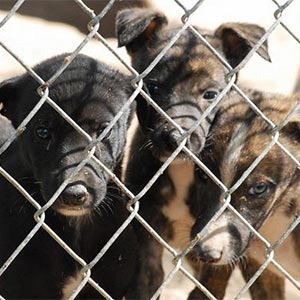American greyhound racing is in decline
In the United States, greyhound racing is a dying industry. Since GREY2K USA Worldwide began its national campaign in 2001, forty-seven American dog tracks have closed or ceased live racing operations. In the country which invented modern commercial greyhound racing, there are now only just two dog tracks remaining in one state. With the 2018 passage of Florida’s Constitutional Amendment 13, all Florida tracks ceased operations by December 2020. This continuing decline is due to increased public awareness about the cruelty of dog racing, a decades-long legislative fight and competition from other forms of gambling. Visit our state-by-state page for more information.
Trends in greyhound gambling
At the same time that overall American gambling on dog racing is plummeting, a trend toward remote gambling continues. In 2022, over 96% of all wagers on dog races were made by simulcast or advanced-deposit wagering.
Types of gambling on dog racing
Gambling on greyhound races in the United States is conducted through three means: live wagering, simulcast wagering, and advance deposit wagering.
Patrons can go to a track to watch and wager on a live greyhound race at one of the two remaining dog tracks in the United States. In 2023, $8,819,511 was wagered live at these two dog tracks.
Gamblers can bet remotely on greyhound races taking place at other tracks through a practice called simulcast wagering. Greyhound simulcast betting is legal and operational in sixteen states. However, two of these states have passed laws to phase out greyhound simulcasting.
In 2022, simulcast wagering on greyhound racing accounted for 54% of all bets placed on dog racing in the United States.
Advance Deposit Wagering (ADW) is a form of betting in which an individual deposits money into an account and that money is subsequently used to pay for pari-mutuel wagers in person, by phone, or online through a licensed provider.
The actual transactions placed by gamblers across the country are processed in Oregon or in North Dakota, the two states where multi-jurisdictional totalizer hubs are legally permitted and operational
In 2023, $144 million was wagered on dog racing though ADW companies with hubs licensed in both Oregon and North Dakota. In 2022, wagering on dog racing via ADW companies accounted for 42% of all dog race wagering in the United States.
Dog tracks are closing around the world
Greyhound racing has run its course. GREY2K USA officially expanded its mission worldwide in 2013, and in 2017 tracks shut down in Australia, Ireland, the United Kingdom and the United States. Macau's deadly Canidrome, the only legal dog track in China, held its last race on June 30, 2018 and 532 surviving dogs were transported to safety around the world. Also, on November 6, 2018, the citizens of Florida voted to close down all of their twelve dog tracks by December 2020. Commercial dog racing became illegal in its original US state as of January 1, 2021. On July 14, 2024, the only legal dog track in Mexico closed.
Fewer greyhounds being bred for global dog racing
While more greyhounds are bred than there is capacity to adopt worldwide, greyhound breeding has declined in recent years.
Since 2015, breeding was reduced by approximately one-third in the greyhound breeding capitals of Australia and Ireland. Combined, these countries bred over 30,000 greyhounds in 2015, and are now breeding just over 20,000.
The number of greyhounds registered to race in the United States in 2020 amounted to less than half of the number reported in 2015.
Altogether roughly 4,200 litters or 25,000 greyhounds are bred annually for racing worldwide, figures that have dropped substantially as dog tracks have closed.
Read our full report “High Stakes” on dog racing in the United States (PDF)





Stay up to date and learn how you can help.